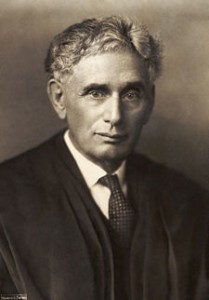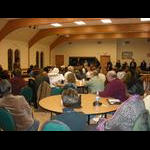Laboratories of Democracy at the Local Level
 Matt Parlow has a thought-provoking new article in print: Progressive Policy-Making on the Local Level: Rethinking Traditional Notions of Federalism, 17 Temp. Pol. & Civ. Rts. L. Rev. 371 (2008). (A draft can be downloaded here.) Matt contends that the oft-quoted argument of Justice Brandeis (pictured to the left) that states may appropriately serve as laboraties for “novel social and economic experiments” applies equally well — indeed, perhaps even better — to cities and other local units of government. Citing recent immigration initiatives and living wage ordinances (including one in Madison, Wisconsin), Matt notes a long history of local-level policy innovation in this country. He argues,
Matt Parlow has a thought-provoking new article in print: Progressive Policy-Making on the Local Level: Rethinking Traditional Notions of Federalism, 17 Temp. Pol. & Civ. Rts. L. Rev. 371 (2008). (A draft can be downloaded here.) Matt contends that the oft-quoted argument of Justice Brandeis (pictured to the left) that states may appropriately serve as laboraties for “novel social and economic experiments” applies equally well — indeed, perhaps even better — to cities and other local units of government. Citing recent immigration initiatives and living wage ordinances (including one in Madison, Wisconsin), Matt notes a long history of local-level policy innovation in this country. He argues,
Because they are smaller in size, local governments are more capable of being responsive to the needs of their respective communities because they are more in touch with their constituents. This leads, in theory, to more responsive and representative policy-making as local government officials make decisions informed by the community’s wants and needs.
In light of these considerations, Matt argues against the tendency of some courts to squelch local initiatives through narrow constructions of home rule powers and liberal invocations of the implied preemption doctrine.
All of this connects nicely to the recent, lively discussion on this Blog of Milwaukee’s ballot initiative mandating paid sick leave for employees. I take it that Matt would be skeptical of arguments that the Milwaukee law is preempted by state and federal law — at the least, his analysis would suggest some good reasons why a court ought to be slow to find preemption.


